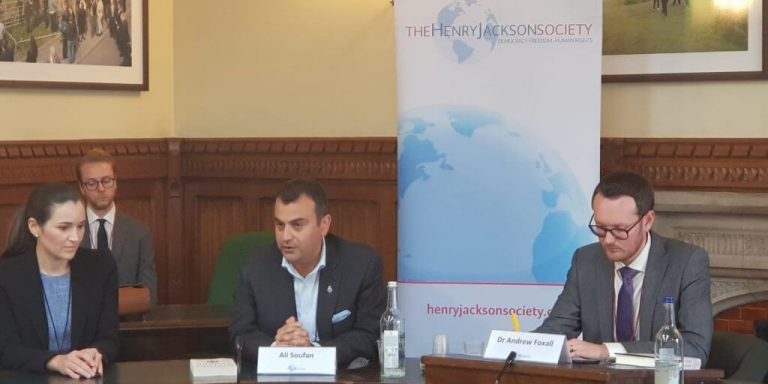On Thursday the 7th June The Henry Jackson Society was delighted to host Ali Soufan for a discussion on the topic of his newest book The Anatomy of Terror. The book explores the particular brand of jihadi terrorism associated with Bin Laden, and details its various developments, the rise of offshoot organizations, and its enduring appeal today.
Soufan began this story immediately before 9/11, arguing that it was at this point that Al Qaeda ceased to be merely a terrorist organization, but transformed into a powerful idea of rebellion against Western imperialists and corrupt regimes of the Middle-East. This idea spread and found sympathetic ears across the region, largely because of the West’s heavy handed response to 9/11, which culminated in Iraq in 2003, and Bin Laden’s refocusing of Al Qaeda as almost a global propaganda organization.
He continues charting the story, relaying how Bin Laden saw the upheaval that spread across the Arab world in the wake of the Arab Spring as an opportunity to solidify Al Qaeda’s influence, and prevent the rise of another powerful US-backed dictator. This occurred shortly before Bin Laden’s death in 2011, but divisions between the leadership of Al Qaeda and the newly forming ISIS were already apparent. These divisions were ideological and methodological; whereas Al Qaeda played a “long-game” waiting to build up its power and influence, ISIS opted to “skip ahead” stages and go straight to establishing a territorial caliphate. Furthermore, ISIS was less skeptical about the idea of attacking and killing other Muslims who did not follow their ideology, something which Bin Laden and later the rest of the Al Qaeda leadership warned against as too divisive an action. Soufan also reminded us that it is important to understand where some of these differences come from. Whereas Al Qaeda was very much an ideological movement, ISIS was created when the US forced together jihadi terrorists and disgruntled Baathists in the wake of the Iraq invasion.
Significantly, just because ISIS has lost its lands thanks to the efforts of the coalition, this does not mean it has lost its ability to inspire. Combating this ideology will require a whole of society approach which can unpick its faulty foundations. We make a mistake in entertaining the idea of a “clash of civilizations”, as influential as it may be in some circles. Accepting this narrative plays into the idea that the West is somehow at war with Islam, which contributes to the popularity of ISIS and jihadi terrorist groups which are seen to be fighting against this. So too does the conflation of Islam with terrorism. It is not that jihadi terrorism and ISIS have nothing to do with Islam, but that we must recognize that these groups cannot be seen as representative of Islam as a whole. Soufan reminds us that the main conflict is intra-civilizational, with the overwhelming majority of the victims of this kind of terrorism being Muslims themselves. Combating ISIS in the field and going after terrorist groups with policing and the law are important steps. But the only way to decisively beat the jihadi terrorist movement is to go after the main source – the ideology.
For more information on this event, please visit here
